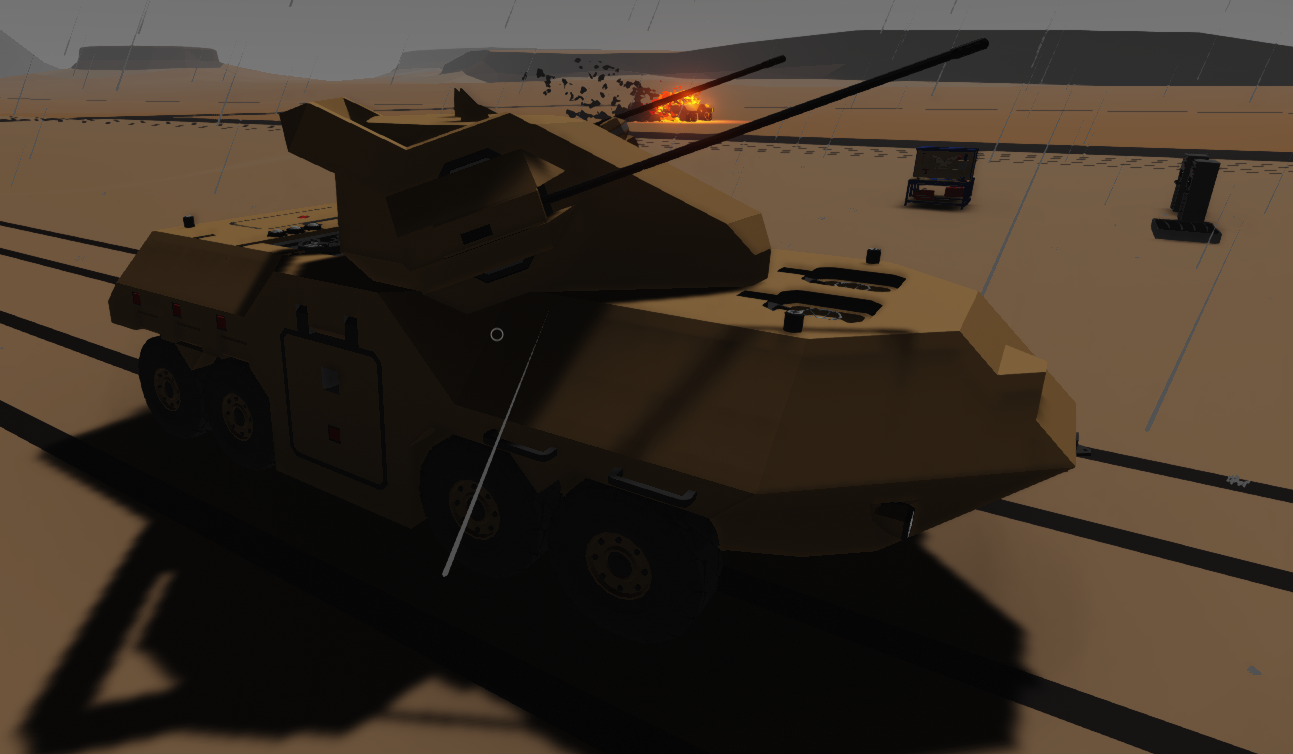1
Type 2 Hexbattalion IFV
(hexbear.net)
News thread IFV project, made in stormworks. Not wholly functional, but enough so that it's going to look the same regardless.
Role: Transport, Medevac, amphibious, anti-air, anti-drone, fire support
Features/design choices:
- Fast on both land and calm waters. This vehicle is more on the "truck" end of IFV rather than "tank". The vehicle spends most of its time ferrying troops around. Can stop small-arms, light munitions, and shrapnel, with armour focused on the crew/passenger compartment.
- Twin 40-mm autocannons, loaded with fragmentation rounds. Can be loaded with AP rounds, but is primarily there for knocking missiles, planes, and drones out. Obviously infantry are going to be threatened by two autocannons as well.
- Side doors. This means that troops can dismount if the vehicle is moving in a column and parks end-to-end. The doors open up, giving cover to evacuating troops. There is a small window for troops to look out of before trying to disembark. This can be a safety issue if hydraulics fail.
- 8 Wheel design is substantially cheaper, faster on roads, and is mildly bouyant. This does mean that the vehicle's cross-country performance suffers, especially in thick mud and other extreme adverse conditions. As a general purpose vehicle to improve infantry's mobility in most conditions, the 8 wheel design was chosen over tracks. It also allows the bulge in the middle, increasing transport capacity.
- 2-frequency RADAR tracking. The vehicle can track aerial targets, and the turret can lock on to a specific target. The gunner can then trim the RADAR output to lead appropriately. I'd code something here, but I'm lazy.
- Turret actually poorly armoured. This helps with balance in water. The primary purpose of this vehicle is to transport them. All the ammunition for the turret is separated by armour, meaning that if the ammo cooks off the passengers and crew are safe. Locating the bulk of the ammo in the turret means there is enough additional space to include light medical facilities.
- Exhaust is dumped behind the rear wheels, which spreads out the exhaust and makes it harder to lock on to with heat-seeker weapons.
Tac notes:
- This is designed to be used as part of a general mechanisation program, not specifically for specialist troops. The idea is to have so many light-air defence systems in a battle space that opposing aircraft, drones, and cruise/tactical missiles will be unable to operate.
- In a pinch, the twin 40s can rip up urban fortifications. However, this is not their primary role. Certainly they shouldn't be used as a preliminary bombardment tool, rather one used for emergencies or particularly good targets.
- Remember that side doors need about an extra meter of clearance to open, so tight streets should be avoided especially for dismounting.
- This vehicle wound up being fairly short. While this makes the vehicle harder to detect, the presence of drones makes this less important. However, lower height makes the vehicle more stable in hilly terrain or in the water. It also means cover against direct-fire weapons (esp. HEAT missiles, which can be tripped by brick walls etc) is easier to find.
- Doctrinally, this is a truck with armour, amphibious capability, and firepower. However, it is likely to be able to defeat most other transport vehicles other than heavy IFVs. A single one of these is capable of extremely disrupting supply lines.
Room for future features:
- Drone launching platforms can be mounted on the front-side slanted armour, with opening hatches like the rear ammunition storage bins.
- There is enough space in the vehicle for a small command centre.
- Missiles could be mounted on the turret pretty easily. Small AA missiles or ATGMs.
- Multiple outlets for exhaust could be used for different situations. For instance, an exhaust outlet underneath the hull to reduce detection chances, and an exhaust above the hull for amphibious operations.
- More electronic warfare options.
Things I had to work around because the game only has 25 cm blocks
- The turret would be a lot flatter IRL. The combination of having to have 25 cm blocks for armour and 25 cm blocks for mechanics means the whole thing is a lot taller. The same goes for all the camera systems.
- I'd probably fit more med-beds in the crew compartment. While they're not in use, troops can dump bags and stuff on them (and just have more leg room).
- With a lot of the space savings from having a maximum of 50 mm RHA instead of 250 mm, I'd probably include a commanders section.
Thoughts:
- So, one of the reasons the Bradley IFV is so big while only transporting 4-ish soldiers is that their turret basket extends the whole height of the vehicle, creating a big space in the middle which I assume is for ammunition storage or a gunner. Obviously, if it's moving around, passengers can't sit there.
- Yes, it looks sort of like a stryker or BTR. How many different shapes could an IFV/APC possibly have?
- The Germans claim the Puma (I think) can stop 125 mm rounds from the front, which sounds optimistic. I didn't bother with that capability.
Anyway, this was a fun exercise.
